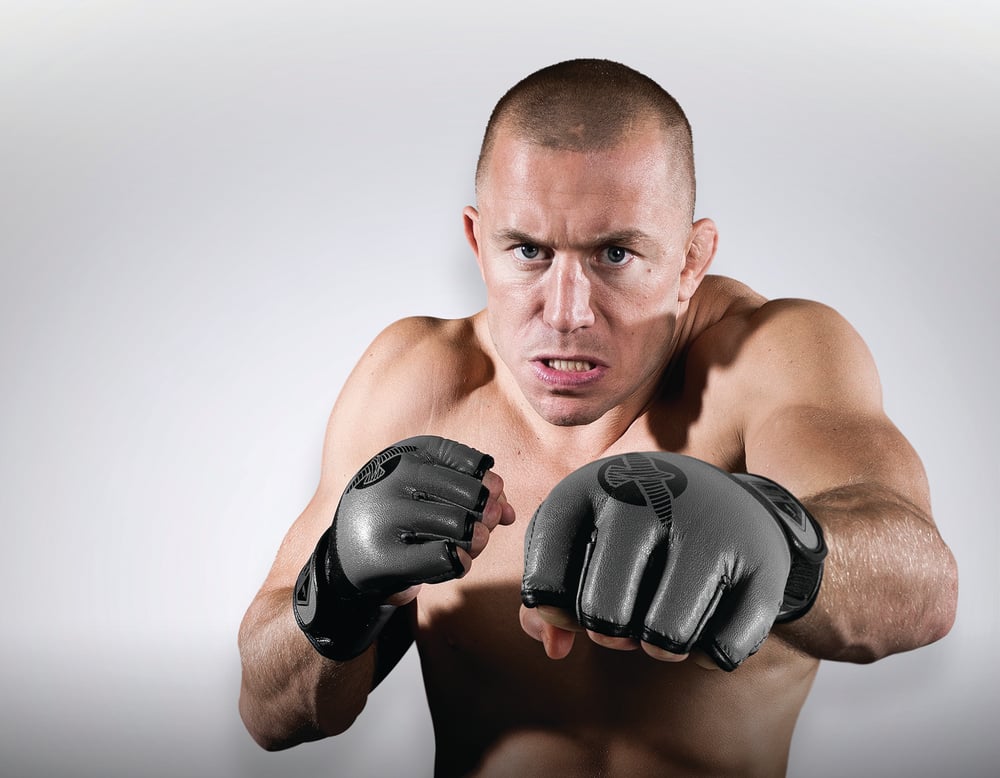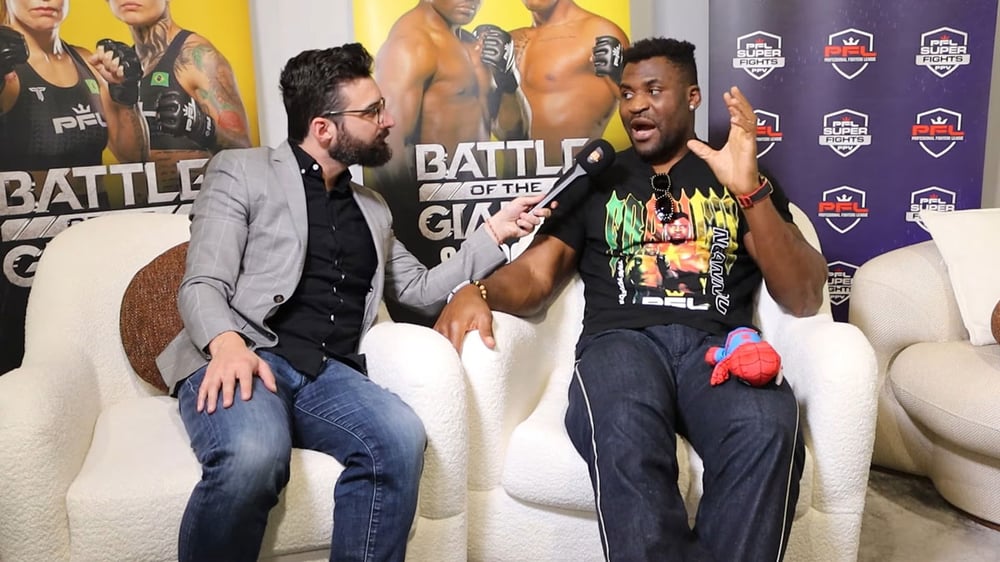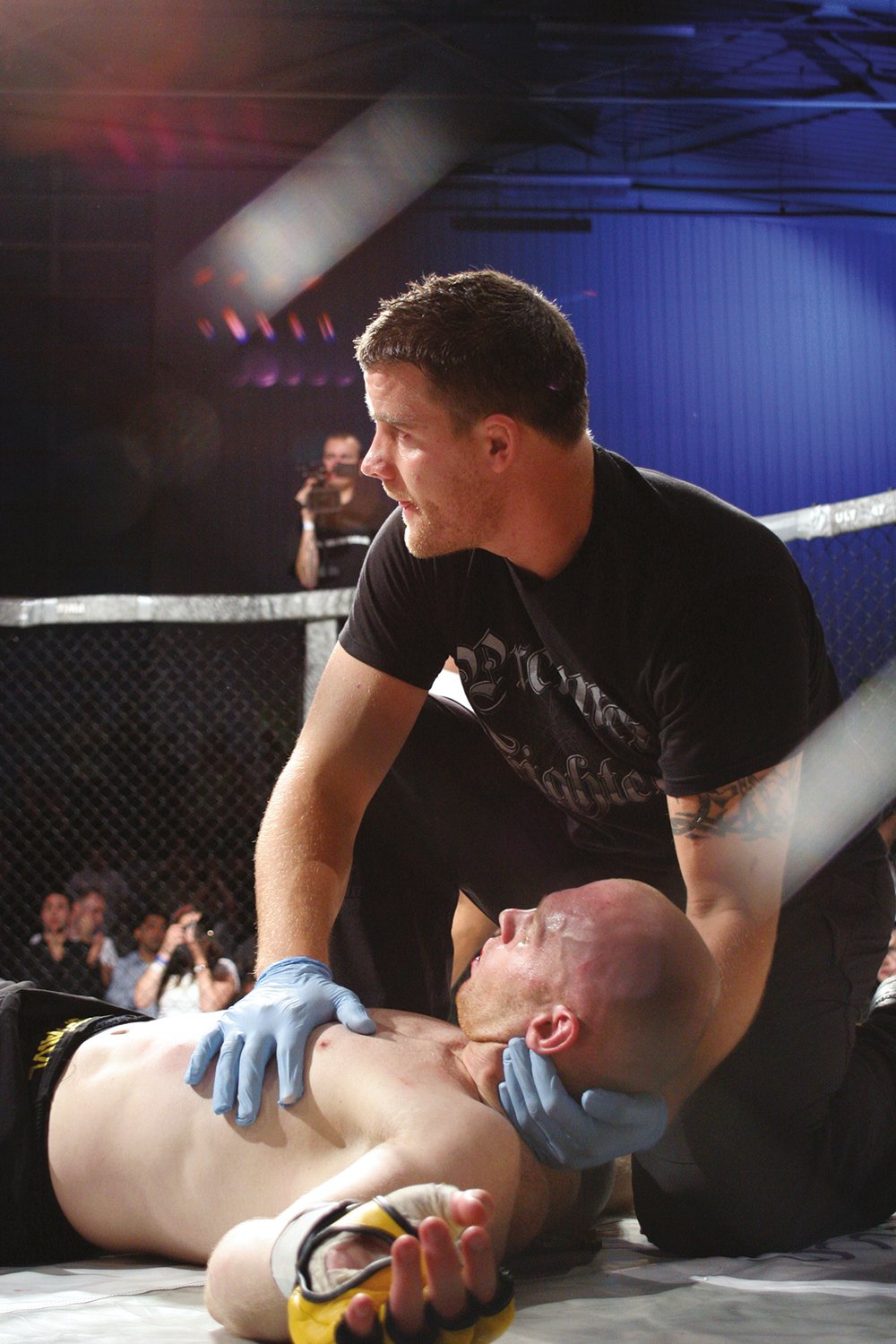
Issue 213
January 2025
Timothy Wheaton interviews MMA’s elite to find out how they conquer their unseen mental battles and uses these insights to light a path forward for his own mental health struggles
Punches heal, but the sting of a nasty meme? Well, that pain can linger forever. Fighters’ greatest successes and epic fails are broadcast to millions, sometimes forging a mindset that wants to devour itself from the inside out like a termite infestation. Sure, the physicality of the job is inherently a fight-or-flight workplace. Still, once the gloves are off, the stresses of anxiety, in many cases around social media, are just one dirty comments section away.
As someone who has grappled with anxiety and stress, I find the ways MMA fighters cultivate their mental resilience deeply intriguing. Millions don’t tune into my failures. My social media is fun-sized enough to get spammed by bots but not famous enough to get free swag or trolled. And yet, I’ve struggled. I set out on a mission to uncover how MMA athletes have developed their strength and capacity to handle the immense pressure.

CHAMPIONS AND STRESS
Georges St-Pierre has openly discussed his mental health struggles. Leading up to championship matches, he was often overwhelmed with so much anxiety it created memory loss. He’s not alone. Other high-ranking fighters like Dustin Poirier and Israel Adesanya have also discussed the feeling of emptiness and depression after losses.
‘Rush’ found his solutions through physical fitness and worked with a sports psychologist. Dustin Poirier employed three strategies: therapy, a strong support system, and mindfulness. He reminds himself that his worth is not measured in wins and losses, and the journey itself is worth enjoying. Israel Adesanya also uses therapy and makes time to totally disconnect from being an MMA fighter.
Why is this an issue for the elite? Well, there may be a stigma around treating mental health in fields that are considered masculine. Athletes are told to toughen up rather than open up. According to a 2019 study, many athletes fear being perceived as weak or jeopardizing their careers by talking about mental health struggles. This stigma is made worse by low mental health literacy, busy schedules, and reinforcing gender stereotypes. Fortunately, fighters are beginning to pull back the veil and discuss these matters to create a broader sense of change everyone can embrace.

BUT IS STRESS HELPFUL?
Dealing with anxiety and stress might be as fun as plucking nose hairs, but are they beneficial for elite athletes? In some ways, yes. Stressors need repeating for athletes to perform at their peak. According to a 2023 study, analysis of Olympic archers during the Tokyo Olympics revealed that psychological stress, measured through elevated heart rates, negatively impacted performance. Even highly trained athletes are negatively affected by stress but must regularly overcome it to improve. Former UFC champion and current PFL world champion Francis Ngannou has had to have a strong head to survive his now-famous life journey.
“I give credit to my hardships, my upbringing,” Ngannou explained to me when I asked him about how he handles his mental health. “The challenges I faced at a young age prepared me for life. Early on, I knew I was on my own and had to take care of everything myself. It was tough, but it prepared me for the future. Now, when things get tough, I know I’ll get through it. Everything in life comes and goes - nothing lasts forever. It’s about resilience. You’ve got to see beyond what’s in front of you because there’s always something better ahead.”
Considering how much Ngannou has gone through, it is a wonder that he can still perform the way he does. I am in awe of his resilience because he has had challenging cards dealt to him, yet he persists anyway. The way he pushes to the future with optimism is a trait that rubs off.
FIGHT DAY FRIGHTS
UK-born Lisa Zimmo had a promising amateur career until a knee injury removed her from the IMMAF competition in the gold medal match. Impressively, she recovered and stormed through IMMAF to reclaim the gold and stand as an undefeated pro-MMA athlete who is systematic regarding her mental health and handling stress.
"It takes time to learn what works for you as an individual," Zimmo explained to me when asked about her relationship with stress. "I'm the kind of person who likes to stay as calm as possible.”
Her fight-day morning routine includes coffee, a peaceful breakfast, and a walk, even if she’s in a new country.
"I always go sightseeing,” she smiles. “I might even go for a coffee outside at a nice café I’ve chosen the night before."
Afterward, she takes time to meditate and visualize the day ahead.
"Sometimes I don’t necessarily sleep during my nap, but it’s part of my meditation. I visualize and stay away from social media. That’s definitely something that’s at the top of my list."
Zimmo also limits her interactions on fight day to stay focused.
"I choose not to speak to too many friends and family because I like to stay in the zone. Usually, my partner is the main person I chat to, and we’d rather not talk about the fight. Instead, we chat about things I’d like to do after the fight - usually about food and where to go because we’re often abroad."
SOCIAL MEDIA SLUMPS
Social media may rank in the marketing dollars, but it’s costing athletes as they are increasingly abused on these platforms since the rise of AI, says a recent paper. Many athletes didn’t need that research to tell us what they already knew.
"Something I’ve learned over time is to give my social media to other people to manage,” says Zimmo. “Usually, my husband does that for me because he’s into it, and he works in sales and media. He’s the one that reminds me to post, which is good."
In her daily life, Zimmo keeps her social media use to a minimum.
"I barely go on Instagram. I’m not obsessed, and it’s not that kind of addiction for me. Maybe I’ll scroll in the morning when I’m having my coffee just to entertain myself, but other than that, not really. It could be anything you see that might trigger your anxiety—comments people might be making, not necessarily about you, but judgments about others that make you worry about being judged yourself."
DIFFERENT DEFENCE MECHANISMS
To protect her mental well-being, Zimmo has created a negativity-free bubble.
"Surround yourself with as much positivity and healthy distractions as possible to keep anxiety as low as you can. Simple things, like going out for a walk or watching your favorite TV shows, really help. Personally, I like watching Netflix, so I’ll put on one of my favorite series, sit down, and just enjoy that. Sometimes, it depends on the type of fighter you are. If you don’t want to see fights happening in front of you or knockout reels, those things might affect some people’s mental health."
Saudi Arabia’s Abdullah Al-Qahtani recently picked up PFL gold, and during our conversation, he emphasized the importance of having a strong community in your corner.
“Look, you need to be around people who understand what you do,” he told me. “I’m not a normal person. I’m not like everyone else. I go to the gym. The gym is my life. What I do in the gym is everything. I need to be careful. I need to be smart about who I hang out with and who I talk to. Because what I do is important, and if someone doesn’t know what I do and makes a joke, it can cause me stress. I need to be around the right people—people who want me to be the best, people who push me to be the best. That’s how I stay good mentally.”

THE SOFTER TOUCH
Australia’s Tai Emery is an MMA fighter who competes in bare-knuckle fighting. In a conversation about her mental health, Emery offered unique insights into her mental health challenges, emphasizing the delicate balance between strength and vulnerability.
"I think fighters are such gentle people," she explains. "Everyone thinks we're big, scary things, but I actually feel like fighters are the most emotional. And I think we're also the most fragile as well. I don't know why, but what I've learned is that we're the most fragile things, as well as the best of the best."
For Emery, this duality stems from the primal way fighters express themselves, but this rawness also makes them susceptible to emotional strain.
"One thing I don't think athletes talk about - and this stems down to the normies - is what happens when they're taken out of a job or something, like full injury time," she says. "When I tore my ACLs, I think that was probably the craziest thing. They talk about identity crisis, like you're not a football player or a fighter anymore. Who are you?"
Despite these challenges, Emery has developed a proactive approach and personal reflection, often using tools like journaling to process her thoughts.
"I'm not afraid of the voices in my head," she laughed. "We all have voices in our heads. People, you've just got to figure it out. Get a diary, get a notebook. Write down what you're thinking. You're alone with yourself -and with yourself at all times."
For Emery, isolation can also play a constructive role in mental health. She views time alone as an opportunity for growth and problem-solving.
"Sometimes, the only way to get through a problem is to take yourself out of it. Don't think about it. Keep doing a million things until you find something that allows you to stop thinking about it."
OVERCOMING STRESS AND ANXIETY
These fighters have helped me see how being organized and systematic is key. Schedules, notebooks, routines, and visualizations all help deal with anxiety. Interestingly, Emery and Zimmo disagree with the habits of Al-Qahtani. The Saudi Arabian fighter seeks a support group while Zimmo and Emery find comfort in solitude. It is a matter of personal preference, but everyone needs to see what works for them. The mental health practices and resilience-building strategies of these MMA fighters have helped me. Though journalling, I realized that I wasn’t getting better and needed more support, so therapy and mindfulness were added to the mix because I was better at reading signals. While many people may never reach the end goal, if there is a slight improvement each week, then I’m winning. It’s about progress. In a sport where resilience is as vital as technique, these fighters remind us all that mental health is not about being unbreakable but building back stronger every time.
...










